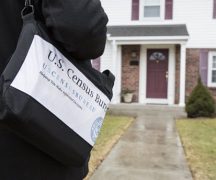By JAN LARSON McLAUGHLIN
BG Independent News
Bowling Green residents have filed 129 complaints with the city since a new “Report a Concern” link was added to the city’s website.
The complaints go to city troubleshooters Martha Woelke and Matt Snow – who are quick to state their preference of the word “concern” over “complaint.”
Since the centralized reporting spot started in July, about 50% of the concerns filed have involved trash, 30% were about housing conditions, 15% were about vehicles parked in improper places, and 5% involved other issues.
Bowling Green officials put the “Report a Concern” link on the city website after hearing from citizens who didn’t know where to go with their complaints. The reporting link can be found under the “How Do I …” link at the top right of the city’s webpage.
“So you as a citizen don’t have to figure out who to call,” said Woelke, the city’s community development administrator. Once a concern is filed, Snow and Woelke send it to the appropriate office and track the resolution.
Citizens can’t be expected to know which city office to call about concerns like those most recently received involving roadkill, a broken street sign, park maintenance, and a broken link on the city website, said Snow, the city’s housing specialist.
It can be confusing, even for those familiar with city government. Civil enforcement handles concerns about trash, parking, indoor furniture sitting outdoors, uncut grass or unshoveled snow. Code enforcement handles issues involving zoning or fence conditions. And the Wood County Health Department deals with housing concerns.
The “Report a Concern” link not only alleviates some of the frustration of filing complaints, but it is also resulting in quicker resolutions.
“We’re pretty responsive. We don’t let them sit,” Woelke said.
And if residents leave their contact information on the form they submit, Snow or Woelke will report back to them on how the issue is being handled.
Their troubleshooting role also extends to nuisance properties in the city. Also starting last summer, Woelke and Snow have organized monthly meetings for city officials to discuss the top 20 property concerns in the city. Involved in those meetings are representatives of the fire division, police division, planning department, civil enforcement, code enforcement, health department, city attorney, city prosecutor, municipal administrator and oftentimes the mayor.
The group discusses possible solutions to nuisance properties – some which may reappear monthly to gauge improvement.
The group looks at all available options before taking legal action, Woelke said.
“We’re really trying to be holistic,” she said. “There are commercial properties and struggling homeowners,” who suffer from physical, mental or aging issues.
The first step is always to link people with resources and referrals they might need, Snow said.
Of the 820 nuisance concerns, 474 have been resolved. Of course, some are easy fixes, such as when an address number falls off a home, potentially creating delays for emergency responders.
But many property issues are more complicated and take much longer to resolve. And they are not limited to one area of the city.
Of the total nuisance complaints, 40% involve owner occupied homes, 55% involve rentals, and 5% involve commercial buildings.
“It is everywhere. Everywhere in the city,” Woelke said. “The assumption is for most residents that it’s all in the first and second wards, but it’s everywhere.”
“There are dots everywhere,” Snow said, referring to a map of the nuisance properties.
For years, the city has had a contract with the Wood County Health Department to conduct an exterior housing survey of Bowling Green every five years.
Snow and Woelke are working to put the survey results to use.
“We wanted to take that data and actually do something with it,” Snow said.
“We’re not trying to be heavy-handed, but we recognize how important it is to maintain our housing stock,” Woelke said.
The problems with nuisance properties go beyond bringing down property values, by also creating public health issues, Woelke pointed out.
Legal action against property owners are reserved for those who are “stonewalling” the city, Snow said.
“That’s our last resort,” Woelke said.
“We want to be compassionate and understanding with everyone’s situation – as long as they are making progress,” Snow said.




